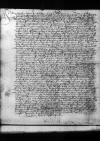 AAWO, AB, D.96, f. 140r
AAWO, AB, D.96, f. 140r
Hochwirdigesten in Got Fursten, Genedigesten / Wolgeporennen Eddle und Gestreng(en) Vil und Groszgunstige Herren. /
Unszere demutige willige dinste mit bszunderem alles beraidtwilligens willens entphelunge seynt Eweren Hogwirdigesten Gnaden / und herleckayte in alle czaidt bevoran entpholen.
Genedigeste Vil und Groszgunstige Herren.
Wasserley gestalt Ewren H(ogwirdigesten) G(naden) und Herl(eckayte) neben andren konnicklichen ⌊dyeszer lande reten⌋ durch die erbaren und namhafft(en) herren ⌊burgermaysteren und radtmannen der stadt Dantczigk⌋ unszeren lyben nogperen und vorwanten / in szachen eyner furgenommennen citation irer(?) bayder burgermayster von ⌊ko(nnickliche)r m(aiesta)t⌋ u(nser) a(llergnediger) h(err) auszgegangen betelichen erszucht. Ouch ir enthalben eyntrechticklichen / am ⌊konnickliche maiestat⌋, / wie wir seynt vorstendiget / geschriben / und noch czur czaidt unbeandtwurtet pliben. Sollichs achten wyr E(wren) H(ogwirdigesten) G(naden) und Herl(eckayte) als dehn sollichs alles kundig czuerrwidderen unnotig und dweyle [...] stain⌈[...][...] stain⌉vir denne durch gemelten ⌊radt von Dantczig⌋ vormitte{e}st irem gsanten. /
Abermols berichtett werden, / das dweyle ire burgermeystere, / die doch personaliter czugesteen nicht geladen, / alszo / bey ⌊konnicklicher m(aiesta)t⌋ geachtett / werden. / Als ab sye durch ire personliche nicht comparition ⌊ko(nnickliche)r m(aiesta)t⌋ u(nser) a(llergnediger) h(err) ladunge vorachtet / und ire phlicht im gehorszam iegen ire ko(nnickliche)r m(aiesta)t vorgessen hetten. / Welchs szo file uns der sachen gelegenhait kundig nicht abenehmen konnen. / Szunderlich dweyle sye uns anczaygen, das sye im ersten angestalten termino durch der stadt sindicum gehalten, / welcher als irer fulkommenner mechtiger und anwalt nicht szol szein angenommen. / Bszunder nochmols ad personalem comparitionem gedrungen / in welche sye sich als vor nicht gehorte und unberuchlich bis anheer in dieszen landen / geweszen / nicht haben geben konnen. / Bszunder in aller undertenickayt und demudt vormittelst gemayner furbitt ⌊ko(nnickliche)r maiestat⌋ gemuts ms. gemuls(!)
⌈gemutsgemuts ms. gemuls(!)
⌉(?) linderunge gesucht und uff das ko(nnickliche)r m(aiesta)t u(nser) a(llergnediger) h(err) allenthalben in genaden vormercken moecht, das sie die geladennen in keyne ungehorszam in allen gebuerenden sachen ungernn wolten befunden werden. / Szo haben szye (als wir an dat(um) dieszes durch iren gsanten gloublich berichtet) eyne ansichtige bottschafft an die ⌊ko(nnickliche)r m(aiesta)t⌋ u(nser) a(llergnediger) h(err) durch iren ubersten secretarium / abgefertiget. /
Ouch erbietende durch dieselbge bey irer ⌊konnicklichen maiestat⌋ aller argwanickayt in undertanickayt czuentleydigen. Dweyle aber der ewige guttige Gott, / wie uns allen kundig diesze tage durch die gwalt ms. gnalt(!)
⌈gwaltgwalt ms. gnalt(!)
⌉ des wassers ire stadt, wie ouch andere ordt groblichen beschediget, / das sollischer schade ane czutadt ⌊ko(nnickliche)r m(aiesta)t⌋ u(nser) a(llergnediger) h(err) sweerlichen vor wynter tagen sweerlichen kan gebessert, repariret und auffgerichtet werden. / Szo das szye von wegen derr erlyttennen scheden, dye unkost die ⌊Weysel⌋ widder in iren gebrouchlich flusz gemayne port der czone und landen czum besten / czubrengen / und szo ouch uff solliche ire aberichtunge in itcziger tewren czaidt die vor handen / derglaychen ires uffennen abgesagten feindes nochtrachtunge, szo drauff erlauffen wil nicht erschwinden koennen.
Derhalben uffs fleysigeste uns bitten laszen und angesucht, das wyr E(wren) H(ogwirdigesten) G(naden) und H(erleckayte) gepurlicher weysze flehenlich anlangen wolten. Dye ⌊ko(nnickliche)r m(aiesta)t⌋ u(nser) a(llergnediger) h(err) undertenicklich czubitten, das ire maiestat seyn begriffen ungenediges gemuedt kegen ⌊die von Danczigk⌋ als eynsgelidts irer m(aiesta)t ⌊dieszes landes radt⌋ und unsers mittels czur lindrunge und die sache hie heer ins landt czu genediger vorhorunge wolt kommen laszen. /
Doneben ouch durch gnedigen czuschub und mittel czu erhaltung der temme und portus gnediglichen vorhelffen, / das wyer(!) instead of wyr⌈wyer(!)wyer(!) instead of wyr⌉ ouch czubescheen hiemite dinstlich und fleyssig bitten / und wellen eynsollichs neben unszeren nogperen und frunden ⌊dehn von Dantczig⌋ kegen die ⌊ko(nnickliche)r m(aiesta)t⌋ in aller undertanigen trew unsers hogsten vormogens.
Ouch in szunderhaidt kegen E(wren) H(ogwirdigesten) G(naden) und Herl(eckayte) als die genedigen und gunstigen der sachen forder und furtrager in unszerem nahmen neben der andren dynstlich und fleysig vordynen / mit Gots hulff der Ewer H(ogwirdigesten) G(naden) und Herl(eckayte) in langer gsunthait und szolicher widderkunfft selig enthalte.


 AAWO, AB, D.96, f. 140v
AAWO, AB, D.96, f. 140v